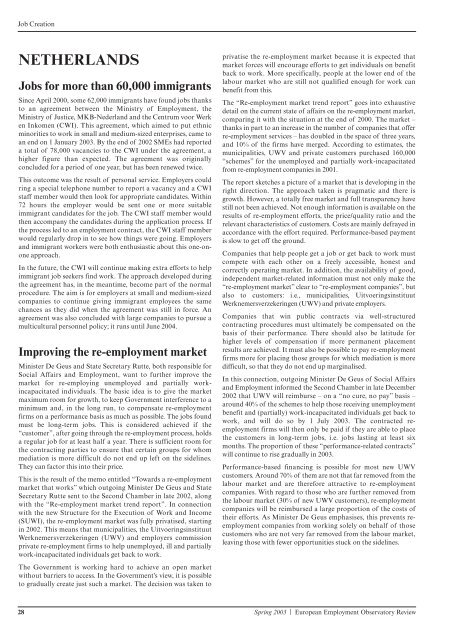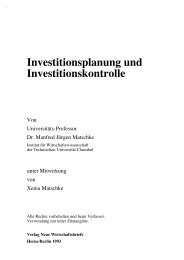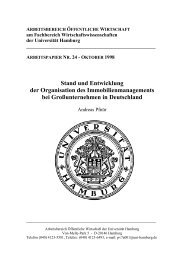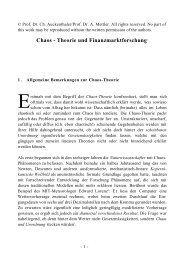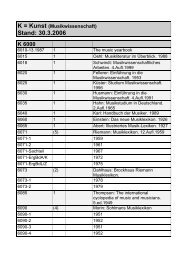FRANCE The
FRANCE The
FRANCE The
Create successful ePaper yourself
Turn your PDF publications into a flip-book with our unique Google optimized e-Paper software.
Job Creation<br />
NETHERLANDS<br />
Jobs for more than 60,000 immigrants<br />
Since April 2000, some 62,000 immigrants have found jobs thanks<br />
to an agreement between the Ministry of Employment, the<br />
Ministry of Justice, MKB-Nederland and the Centrum voor Werk<br />
en Inkomen (CWI). This agreement, which aimed to put ethnic<br />
minorities to work in small and medium-sized enterprises, came to<br />
an end on 1 January 2003. By the end of 2002 SMEs had reported<br />
a total of 78,000 vacancies to the CWI under the agreement, a<br />
higher figure than expected. <strong>The</strong> agreement was originally<br />
concluded for a period of one year, but has been renewed twice.<br />
This outcome was the result of personal service. Employers could<br />
ring a special telephone number to report a vacancy and a CWI<br />
staff member would then look for appropriate candidates. Within<br />
72 hours the employer would be sent one or more suitable<br />
immigrant candidates for the job. <strong>The</strong> CWI staff member would<br />
then accompany the candidates during the application process. If<br />
the process led to an employment contract, the CWI staff member<br />
would regularly drop in to see how things were going. Employers<br />
and immigrant workers were both enthusiastic about this one-onone<br />
approach.<br />
In the future, the CWI will continue making extra efforts to help<br />
immigrant job seekers find work. <strong>The</strong> approach developed during<br />
the agreement has, in the meantime, become part of the normal<br />
procedure. <strong>The</strong> aim is for employers at small and medium-sized<br />
companies to continue giving immigrant employees the same<br />
chances as they did when the agreement was still in force. An<br />
agreement was also concluded with large companies to pursue a<br />
multicultural personnel policy; it runs until June 2004.<br />
Improving the re-employment market<br />
Minister De Geus and State Secretary Rutte, both responsible for<br />
Social Affairs and Employment, want to further improve the<br />
market for re-employing unemployed and partially workincapacitated<br />
individuals. <strong>The</strong> basic idea is to give the market<br />
maximum room for growth, to keep Government interference to a<br />
minimum and, in the long run, to compensate re-employment<br />
firms on a performance basis as much as possible. <strong>The</strong> jobs found<br />
must be long-term jobs. This is considered achieved if the<br />
“customer”, after going through the re-employment process, holds<br />
a regular job for at least half a year. <strong>The</strong>re is sufficient room for<br />
the contracting parties to ensure that certain groups for whom<br />
mediation is more difficult do not end up left on the sidelines.<br />
<strong>The</strong>y can factor this into their price.<br />
This is the result of the memo entitled “Towards a re-employment<br />
market that works” which outgoing Minister De Geus and State<br />
Secretary Rutte sent to the Second Chamber in late 2002, along<br />
with the “Re-employment market trend report”. In connection<br />
with the new Structure for the Execution of Work and Income<br />
(SUWI), the re-employment market was fully privatised, starting<br />
in 2002. This means that municipalities, the Uitvoeringsinstituut<br />
Werknemersverzekeringen (UWV) and employers commission<br />
private re-employment firms to help unemployed, ill and partially<br />
work-incapacitated individuals get back to work.<br />
<strong>The</strong> Government is working hard to achieve an open market<br />
without barriers to access. In the Government's view, it is possible<br />
to gradually create just such a market. <strong>The</strong> decision was taken to<br />
privatise the re-employment market because it is expected that<br />
market forces will encourage efforts to get individuals on benefit<br />
back to work. More specifically, people at the lower end of the<br />
labour market who are still not qualified enough for work can<br />
benefit from this.<br />
<strong>The</strong> “Re-employment market trend report” goes into exhaustive<br />
detail on the current state of affairs on the re-employment market,<br />
comparing it with the situation at the end of 2000. <strong>The</strong> market –<br />
thanks in part to an increase in the number of companies that offer<br />
re-employment services – has doubled in the space of three years,<br />
and 10% of the firms have merged. According to estimates, the<br />
municipalities, UWV and private customers purchased 160,000<br />
“schemes” for the unemployed and partially work-incapacitated<br />
from re-employment companies in 2001.<br />
<strong>The</strong> report sketches a picture of a market that is developing in the<br />
right direction. <strong>The</strong> approach taken is pragmatic and there is<br />
growth. However, a totally free market and full transparency have<br />
still not been achieved. Not enough information is available on the<br />
results of re-employment efforts, the price/quality ratio and the<br />
relevant characteristics of customers. Costs are mainly defrayed in<br />
accordance with the effort required. Performance-based payment<br />
is slow to get off the ground.<br />
Companies that help people get a job or get back to work must<br />
compete with each other on a freely accessible, honest and<br />
correctly operating market. In addition, the availability of good,<br />
independent market-related information must not only make the<br />
“re-employment market” clear to “re-employment companies”, but<br />
also to customers: i.e., municipalities, Uitvoeringsinstituut<br />
Werknemersverzekeringen (UWV) and private employers.<br />
Companies that win public contracts via well-structured<br />
contracting procedures must ultimately be compensated on the<br />
basis of their performance. <strong>The</strong>re should also be latitude for<br />
higher levels of compensation if more permanent placement<br />
results are achieved. It must also be possible to pay re-employment<br />
firms more for placing those groups for which mediation is more<br />
difficult, so that they do not end up marginalised.<br />
In this connection, outgoing Minister De Geus of Social Affairs<br />
and Employment informed the Second Chamber in late December<br />
2002 that UWV will reimburse – on a “no cure, no pay” basis –<br />
around 40% of the schemes to help those receiving unemployment<br />
benefit and (partially) work-incapacitated individuals get back to<br />
work, and will do so by 1 July 2003. <strong>The</strong> contracted reemployment<br />
firms will then only be paid if they are able to place<br />
the customers in long-term jobs, i.e. jobs lasting at least six<br />
months. <strong>The</strong> proportion of these “performance-related contracts”<br />
will continue to rise gradually in 2003.<br />
Performance-based financing is possible for most new UWV<br />
customers. Around 70% of them are not that far removed from the<br />
labour market and are therefore attractive to re-employment<br />
companies. With regard to those who are further removed from<br />
the labour market (30% of new UWV customers), re-employment<br />
companies will be reimbursed a large proportion of the costs of<br />
their efforts. As Minister De Geus emphasises, this prevents reemployment<br />
companies from working solely on behalf of those<br />
customers who are not very far removed from the labour market,<br />
leaving those with fewer opportunities stuck on the sidelines.<br />
28 Spring 2003 | European Employment Observatory Review


